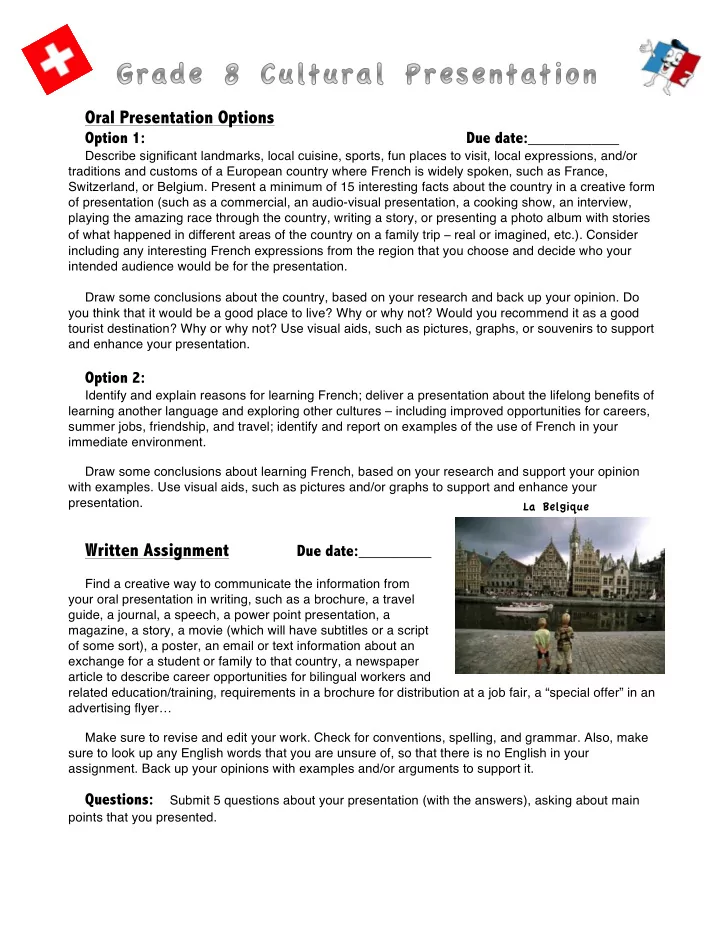

Oral Presentation Options Option 1: Due date:__________ Describe significant landmarks, local cuisine, sports, fun places to visit, local expressions, and/or traditions and customs of a European country where French is widely spoken, such as France, Switzerland, or Belgium. Present a minimum of 15 interesting facts about the country in a creative form of presentation (such as a commercial, an audio-visual presentation, a cooking show, an interview, playing the amazing race through the country, writing a story, or presenting a photo album with stories of what happened in different areas of the country on a family trip – real or imagined, etc.). Consider including any interesting French expressions from the region that you choose and decide who your intended audience would be for the presentation. Draw some conclusions about the country, based on your research and back up your opinion. Do you think that it would be a good place to live? Why or why not? Would you recommend it as a good tourist destination? Why or why not? Use visual aids, such as pictures, graphs, or souvenirs to support and enhance your presentation. Option 2: Identify and explain reasons for learning French; deliver a presentation about the lifelong benefits of learning another language and exploring other cultures – including improved opportunities for careers, summer jobs, friendship, and travel; identify and report on examples of the use of French in your immediate environment. Draw some conclusions about learning French, based on your research and support your opinion with examples. Use visual aids, such as pictures and/or graphs to support and enhance your presentation. La Belgique Written Assignment Due date:________ Find a creative way to communicate the information from your oral presentation in writing, such as a brochure, a travel guide, a journal, a speech, a power point presentation, a magazine, a story, a movie (which will have subtitles or a script of some sort), a poster, an email or text information about an exchange for a student or family to that country, a newspaper article to describe career opportunities for bilingual workers and related education/training, requirements in a brochure for distribution at a job fair, a “special offer” in an advertising flyer… Make sure to revise and edit your work. Check for conventions, spelling, and grammar. Also, make sure to look up any English words that you are unsure of, so that there is no English in your assignment. Back up your opinions with examples and/or arguments to support it. Questions: Submit 5 questions about your presentation (with the answers), asking about main points that you presented.
Curriculum Expectations For Grade 8 Cultural Oral Presentation: By the end of grade 8, students will: B1. Speaking to Communicate: communicate information and ideas orally in French, using a variety of speaking strategies and age- and grade-appropriate language suited to the purpose and audience; B1.1 Using Oral Communication Strategies: identify a range of speaking strategies and use them appropriately to express themselves clearly and coherently in French for various purposes and to a variety of audiences (e.g., adjust volume and tone to suit the message and context; use dramatic pauses in a role play to create suspense; rehearse the delivery of spoken messages) B1.2 Producing Oral Communications: produce rehearsed and increasingly spontaneous messages in French to communicate ideas and information about matters of personal interest, with contextual, auditory, and visual support B1.3 Speaking with Fluency: speak with � a smooth pace, appropriate intonation, � and accurate pronunciation in rehearsed communications about a range of familiar topics B3. Intercultural Understanding: in their spoken communications, demonstrate an awareness of aspects of culture in diverse French-speaking communities and other communities around the world, and of the appropriate use of French sociolinguistic conventions in a variety of situations. B3.1 Intercultural Awareness: communicate information orally about French-speaking communities in Europe, including aspects � of their cultures and their contributions to � la francophonie and the world, and make connections to personal experiences and � their own and other communities B3.2 Awareness of Sociolinguistic Conventions: identify sociolinguistic conventions associated with a variety of social situations in diverse French-speaking communities.* Curriculum expectations for Cultural Written Assignment: By the end of Grade 8, students will: D1. Purpose, Audience, and Form: write French texts for different purposes and audiences, using a variety of forms and knowledge of language structures and conventions appropriate for this level; D1.1 Identifying Purpose and Audience: determine, with support from the teacher, � their purpose in writing and the audience for French texts they plan to create. D1.2 Writing in a Variety of Forms: write a variety of age- and grade-appropriate French texts, applying their knowledge of the basic structural and stylistic elements of each form. D1.3 Applying Language Conventions: communicate their meaning clearly, using parts of speech appropriately and following conventions for correct spelling, word order, and punctuation. D3. Intercultural Understanding: in their written work, demonstrate an awareness of aspects of culture in diverse French-speaking communities and other communities around the world, D3.1 Intercultural Awareness: in their written work, communicate information about French- speaking communities in Europe, including aspects of their cultures and their contributions to la francophonie and the world, and make connections to personal experiences and their own and other communities. D3.2 Awareness of Sociolinguistic Conventions: identify sociolinguistic conventions associated with a variety of social situations in diverse French-speaking communities* and use them appropriately in their written work. ( * Students are encouraged to identify examples of usage that is specific to particular regions or communities, such as French- speaking communities in Europe, but are not expected to do so.)
Recommend
More recommend